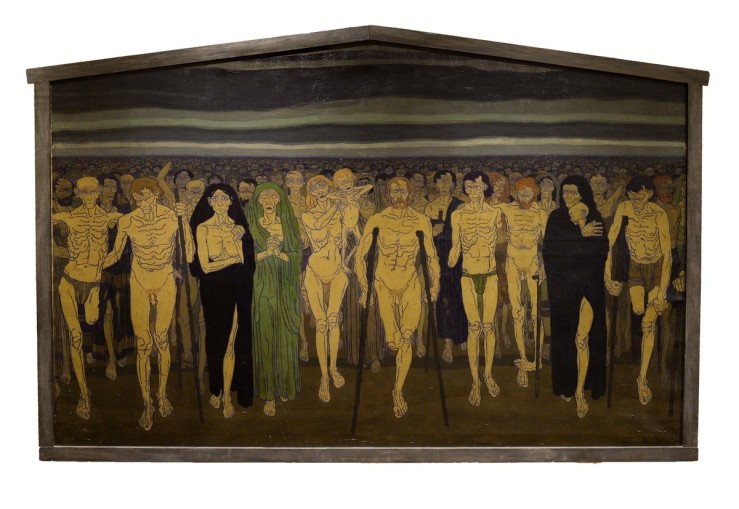Blogger’s Note: One of the first three departments created in 1789 in the new executive branch of the United States government was the War Department—now called the Department of Defense. Having witnessed the evils of war firsthand while serving as surgeon general of the Middle Department of the Continental Army, founding father Benjamin Rush published an essay in Banneker’s Almanac in 1793 advocating for the formation of a cabinet-level Department of Peace to promote a counterethic. Among other things, his proposed Secretary of Peace would be responsible for abolishing capital punishment; dissolving state militias, including getting rid of military uniforms and titles; and providing every family with a Bible by which to become educated in Christ’s law.
His plan even provides for the interior decoration of the Peace Office—which must include lamb, dove, and olive branch imagery; biblical inscriptions; and a collection of plowshares and pruning hooks cast from swords and spears—as well as its sonic environment: the daily singing of peace hymns. The War Office, by contrast, should display images of death and destruction and bear cautionary inscriptions.
Literary satire, maybe. Then again, maybe not. Rush was an uncompromising champion of many causes throughout his lifetime, including, besides nonviolence, public education, prison and mental health reform, the abolition of slavery, mass distribution of Bibles, and temperance. While his proposal for a U.S. Department of Peace may sound airy-fairy and ridiculous, he very much believed in its practicality, and his confidence has been matched by twentieth- and twenty-first-century politicians: since the publication of Rush’s “Plan of a Peace-Office,” almost a hundred bills have been introduced in Congress proposing the creation of such a department, most recently in 2015.
The following essay is rekeyed in its entirety from Benjamin Rush’s Essays, Literary, Moral, and Philosophical (Philadelphia: Thomas & Samuel F. Bradford, 1798).

“A Plan of a Peace-Office for the United States”
Benjamin Rush
Among the defects which have been pointed out in the Federal Constitution by its antifederal enemies, it is much to be lamented that no person has taken notice of its total silence upon the subject of an office of the utmost importance to the welfare of the United States, that is, an office for promoting and preserving perpetual peace in our country.
It is to be hoped that no objection will be made to the establishment of such an office, while we are engaged in a war with the Indians, for as the War-Office of the United States was established in time of peace, it is equally reasonable that a Peace-Office should be established in the time of war.
The plan of this office is as follows:
I. Let a Secretary of the Peace be appointed to preside in this office, who shall be perfectly free from all the present absurd and vulgar European prejudices upon the subject of government. Let him be a genuine republican and a sincere Christian, for the principles of republicanism and Christianity are no less friendly to universal and perpetual peace than they are to universal and equal liberty.
II. Let a power be given to this Secretary to establish and maintain free-schools in every city, village, and township of the United States; and let him be made responsible for the talents, principles, and morals of all his schoolmasters. Let the youth of our country be carefully instructed in reading, writing, and arithmetic, and in the doctrines of a religion of some kind: the Christian religion should be preferred to all others, for it belongs to this religion exclusively to teach us not only to cultivate peace with men, but to forgive—nay more, to love—our very enemies. It belongs to it further to teach us that the Supreme Being alone possesses a power to take away human life, and that we rebel against his laws whenever we undertake to execute death in any way whatever upon any of his creatures.
III. Let every family in the United States be furnished at the public expense, by the Secretary of this office, with a copy of an American edition of the BIBLE. This measure has become the more necessary in our country since the banishment of the Bible, as a school-book, from most of the schools in the United States. Unless the price of this book be paid for by the public, there is reason to fear that in a few years it will be met with only in courts of justice or in magistrates’ offices; and should the absurd mode of establishing truth by kissing this sacred book fall into disuse, it may probably, in the course of the next generation, be seen only as a curiosity on a shelf in a public museum.
IV. Let the following sentence be inscribed in letters of gold over the doors of every State and Court house in the United States:
THE SON OF MAN CAME INTO THE WORLD NOT TO DESTROY MEN’S LIVES, BUT TO SAVE THEM.
V. To inspire a veneration for human life, and an horror at the shedding of blood, let all those laws be repealed which authorize juries, judges, sheriffs, or hangmen to assume the resentments of individuals and to commit murder in cold blood in any case whatever. Until this reformation in our code of penal jurisprudence takes place, it will be in vain to attempt to introduce universal and perpetual peace in our country.
VI. To subdue that passion for war which education, added to human depravity, have made universal, a familiarity with the instruments of death, as well as all military shows, should be carefully avoided. For which reason, militia laws should everywhere be repealed, and military dresses and military titles should be laid aside: reviews tend to lessen the horrors of a battle by connecting them with the charms of order; militia laws generate idleness and vice, and thereby produce the wars they are said to prevent; military dresses fascinate the minds of young men, and lead them from serious and useful professions; were there no uniforms, there would probably be no armies; lastly, military titles feed vanity, and keep up ideas in the mind which lessen a sense of the folly and miseries of war.
VII. In the last place, let a large room, adjoining the federal hall, be appropriated for transacting the business and preserving all the records of this office. Over the door of this room let there be a sign, on which the figure of a LAMB, a DOVE, and an OLIVE BRANCH should be painted, together with the following inscriptions in letters of gold:
PEACE ON EARTH—GOOD-WILL TO MAN. AH! WHY WILL MEN FORGET THAT THEY ARE BRETHREN?
Within this apartment let there be a collection of plough-shares and pruning-hooks made out of swords and spears; and on each of the walls of the apartment, the following pictures as large as life:
- A lion eating straw with an ox, and an adder playing upon the lips of a child.
- An Indian boiling his venison in the same pot with a citizen of Kentucky.
- Lord Cornwallis and Tippoo Saib, under the shade of a sycamore-tree in the East Indies, drinking Madeira wine together out of the same decanter.
- A group of French and Austrian soldiers dancing arm and arm, under a bower erected in the neighborhood of Mons.
- A St. Domingo planter, a man of color, and a native of Africa, legislating together in the same colonial assembly.
To complete the entertainment of this delightful apartment, let a group of young ladies, clad in white robes, assemble every day at a certain hour, in a gallery to be erected for the purpose, and sing odes, and hymns, and anthems in praise of the blessings of peace.
One of these songs should consist of the following lines:

In order to more deeply affect the minds of the citizens of the United States with the blessings of peace, by contrasting them with the evils of war, let the following inscriptions be painted upon the sign which is placed over the door of the War Office:
- An office for butchering the human species.
- A Widow and Orphan making office.
- A broken bone making office.
- A wooden leg making office.
- An office for the creating of public and private vices.
- An office for creating a public debt.
- An office for creating speculators, stock jobbers, and bankrupts.
- An office for creating famine.
- An office for creating pestilential diseases.
- An office for creating poverty, and the destruction of liberty and national happiness.
In the lobby of this office let there be painted representations of all the common military instruments of death, also human skulls, broken bones, unburied and putrefying dead bodies, hospitals crowded with sick and wounded soldiers, villages on fire, mothers in besieged towns eating the flesh of their children, ships sinking in the ocean, rivers dyed with blood, and extensive plains without a tree or fence or any object but the ruins of deserted farm houses.
Above this group of woeful figures, let the following words be inserted, in red characters to represent human blood:
NATIONAL GLORY

I belong, support and increasingly promote the Peace Alliance, and those, like Dennis Kucinich, who support a creation for a Department of Peace, and a Secretary of Peace to counter the ideas of the Department of State, and the State Department, both which do have an interest in peace, but ultimately, are driven towards disagreements and use of force. I must say, I believe that I will study Benjamin Rush, a founding father, that has now sparked my interested.
Have a Department of Peace clearly aligns itself with Christianity, but it also aligns itself with Buddhism, and the great, or small, Western or Eastern, which advocate and practice love, forgiveness, and respect for all life. I understand the need to promote Christianity, but in our current day, we must allow everyone to practice, or not practice their beliefs, but we should be promoting peaceful reconciliation, diplomacy in so far as it promotes peace, not merely the absence of war which is still a negative peace.
I find this blog to be incredible. I will continue to follow your blog. Bless your blog, and your ideas, and historical knowledge. I am also an artist, and lover of history.
LikeLike
[…] (Related post: “ESSAY: ‘A Plan of a Peace-Office for the United States’ by Benjami… […]
LikeLike
[…] (Related posts: “Songs of Lament and Justice by The Porter’s Gate”; 1798 essay, “A Plan of a Peace-Office for the United States” by Benjamin Rush) […]
LikeLike